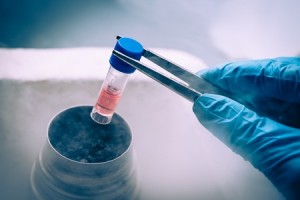
How Ovarian Tissue Freezing Can Preserve Your Future Fertility
 You can preserve your future fertility through ovarian tissue freezing. Why is this good news? The National Institutes of Health reported that [h]uman ovarian tissue transplantation has resulted in the birth of over 70 children worldwide. Look: Preserving female fertility through ovarian tissue freezing is trending today because it is a proven safe and successful procedure.
You can preserve your future fertility through ovarian tissue freezing. Why is this good news? The National Institutes of Health reported that [h]uman ovarian tissue transplantation has resulted in the birth of over 70 children worldwide. Look: Preserving female fertility through ovarian tissue freezing is trending today because it is a proven safe and successful procedure.
Candidates for Ovarian Tissue Freezing
A woman only releases one egg per month during her natural cycle. It only takes one good quality egg to have a healthy baby.
There are many females who should consider ovarian tissue freezing.
- Female children who do not have fully developed ovaries
- Female children or teenage girls who have been diagnosed with cancer
- Women in their prime reproductive years who have been diagnosed with cancer
- Women wanting to postpone motherhood past their prime reproductive years
- Women wanting to donate their ovarian tissue to help women who are unable to produce good eggs
Celebrated Experts Helping to Preserve Future Fertility
The celebrated fertility specialists at New Hope Fertility Center provide all-encompassing cryopreservation techniques for protecting the fertility of both women and men.
- Ovarian Tissue Freezing
- Egg (oocyte cryopreservation) and embryo freezing
- Sperm freezing
How Ovarian Tissue Freezing Preserves Future Fertility
Ovarian tissue freezing is accomplished through an outpatient surgical procedure by removing a thin piece of the outer membrane of one of the woman’s ovary – the preserved ovary. The outer membrane of an ovary is where a woman’s eggs are located. This ovarian tissue is cryopreserved for later transplant to the woman’s other ovary – the non-preserved ovary.
According to a 2015 study published in the journal of Human Reproduction, 10 out of 32 women facing chemotherapy were able to conceive naturally after undergoing ovarian tissue freezing before cancer treatment.
Natural Fertility Restored
At some determined time in her future, a woman’s fertility can be readily restored and she can naturally have a baby.
- The woman’s frozen ovarian tissue is retrieved from cryopreservation and thawed
- The ovarian tissue is transplanted to the patient’s ovary through simple stitching in an outpatient procedure involving minimal pain
- The ovarian tissue comes to life and begins to function normally – as though it were never removed
- The woman can then conceive naturally without the need for In Vitro Fertilization (IVF)
Convenient Conception Options Post-Ovarian Tissue Transplant
To help along the natural conception of a baby for women who have undergone an ovarian tissue transplant, New Hope Fertility Center offers:
- Timed Intercourse
- Intrauterine Insemination (IUI)
Timed Intercourse
By monitoring your ovarian cycle through ultrasound and blood tests, the fertility care team at New Hope Fertility Center will determine your optimal time for intercourse – your ovulation window. To increase your chances of conception, determining your ovulation window gives you the 2 to 3 day period every month that is the optimal time for you and your partner to have sexual intercourse.
Your basal body temperature will rise in the two days following ovulation. This temp rise can last for one to three days post-ovulation. The longer your basal body temperature stays high, the better chance you have of conceiving with regular sexual intercourse during your ovulation window.
Medicated Timed Intercourse
A variation of timed intercourse is Medicated Timed Intercourse. Here’s the deal: Typically, a woman only produces one healthy egg per monthly cycle. With Medicated Timed Intercourse, you will be prescribed oral fertility medications – Clomid or Femara – to stimulate your ovaries into producing multiple eggs during one monthly cycle. Because you are producing multiple eggs, your chances of conception increase during your ovulation window during a timed intercourse cycle. But there’s a catch: A multiple pregnancy may be conceived through Medicate Time Intercourse.
Intrauterine Insemination (IUI)
Timed intercourse is often used in conjunction with Intrauterine Insemination (IUI). IUI is the generally the same treatment protocol followed through medicated timed intercourse. After an injectable ovulation trigger medication – hCG – has been self-administered, a concentrated amount of sperm is inserted into the woman’s uterus via her cervix in a simple office procedure similar to a Pap smear.
Fertility Preservation Specialist
Ovarian tissue freezing is a state-of-the-art fertility preservation technique. It is important to work with a fertility care doctor having the experience required to design a customized fertility preservation treatment plan meeting your personal needs. To schedule your initial consultation with Dr. John Zhang at New Hope Fertility Center – click the icon below – or call 917.525.5496.